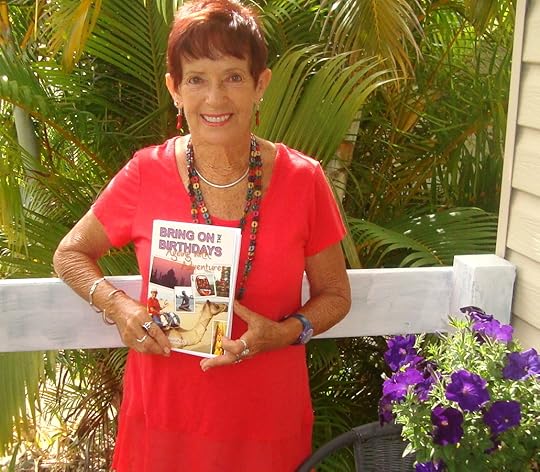Robin Storey's Blog, page 12
July 8, 2013
Three Crooked Kings – compelling true story of police corruption
Three Crooked Kings
It’s a broad sweep of a story, taking place from the 1940s to the 1980s. It has a cast of complex and fascinating characters – a charismatic but crooked police commissioner, a commissioner in the making who rises quietly through the ranks with his eye on the plum job, a corrupt police force who not only turns a blind eye to crime but instigates it, a prostitute who’s the confidante of some of the most powerful and amoral police officers, a hardworking lawyer who goes into politics vowing to expose the corruption and a large supporting cast from petty criminals to politicians.
And what is so amazing is that it’s a true story. The book is Three Crooked Kings, the saga of Queensland and half a century of corruption in the corridors of power that culminated in The Fitzgerald Inquiry into police corruption of 1987 – 1989.
The author, award-winning journalist and novelist Matthew Condon, had unprecedented access to the dairies and personal papers of deposed and jailed police commissioner Terry Lewis, as well as interviews with hundreds of key players. He’s done an excellent job of crafting his research into a very readable and entertaining book.
Despite the inevitable facts and figures he never once descends into dry reportage, with the backdrop of the growth of Brisbane and the rapidly changing society. He’s quoted as saying that he initially wondered how he could combine all these characters and information into a coherent story, until he decided to write it as he would a novel. It was the right decision, as the narrative flows easily and seamlessly from one era to the next.
The book was especially interesting to me, as I was born and brought up in Queensland and it was fascinating to read about all the things that were happening in the echelons of power that I was blissfully unaware of in my childhood. When an event was mentioned, I put it in the context of my own life, thinking back to where I was living and what I was doing at the time. I lived in Brisbane as a teenager and young adult, so many of the places mentioned are familiar to me. It’s strange to think of the many times I frequented the National Hotel and never knew it was it was the scene of prostitution and illegal after hours drinking with high ranking police.
The backbone of the book is the life and rise of Terry Lewis to police commissioner. He has always maintained his innocence of any wrongdoing, referring to his trial and imprisonment for corruption as a ‘travesty of justice.’ Condon presents a balanced and objective view, providing many sides to each story, which often include conflicting evidence and witnesses. He raises questions that remain unanswered and points out discrepancies, but leaves it up to the reader to draw their own conclusions. Which is how it should be.
This book is the first of a duology. The second, called All Fall Down, due out later this year, will continue the story with events leading up to the Fitzgerald Inquiry, Terry Lewis’s fall from grace and his imprisonment. Although these books may be primarily of interest to Australians and in particular, Queenslanders, this chronicle of corruption could have taken place in any country – after all, it’s about the universal human quest for power and influence, and everything that goes with it – ambition, love, revenge, loyalty and betrayal.
If you’ve read Three Crooked Kings, or perhaps a similar book that kept you up reading way past your bedtime, I'd love to hear your comments.
May 29, 2013
SELF-PUBLISHING – IS IT REAL?

Making the decision to self-publish can be difficult
Despite the greater acceptance these days of indie publishing, there’s still a stigma against those who make the decision to self-publish. From my own experiences, criticism of self-publishing comes not from the readers – most of those I’ve encountered have been effusive in their support and admiration – but other writers.
Author and coach Corrina Gordon-Barnes recounts her experiences in a recent blog post on The Creative Penn:
'A man and I are chatting in the conference tea break. We know each other from a while back and now he asks what I’ve been up to the last couple of years. Proudly, I share how I’ve published my first book and how much I enjoy receiving feedback from happy readers.
He’s impressed, interested, engaged. Until he clocks that I’ve chosen the independent publishing route. Then, his face falls.
“Oh, I see. It’s not real publishing then.”
Read the rest here...
That kind of attitude can make it difficult for writers to make the decision – do I pull out all stops to try to get a traditional publishing contract or save myself the time and energy and go straight to self-publishing? It would be interesting to know what proportion of writers decided to self publish as their first choice, as opposed to those who made the decision after their work had been rejected by traditional publishers.
I fall into the second category and initially it can be hard, particularly as a debut author, not to see the decision to self-publish as a kind of failure – even though traditional publishers have been quoted on many occasions as saying that a rejection of your novel is not necessarily a reflection of its quality – just that it’s not right for them at that particular time.
But I soon got over that feeling, and what helped was that so many of my family, friends and colleagues, and people I hardly knew, expressed admiration and support when I told them I was publishing a book on Amazon. Non-writers are often in awe of the amount of effort and knowledge that goes into writing and publishing a book, and the courage required to put it out into the world. So if you make the decision to do it, you can’t afford to be apologetic about it. You need to be confident that you’ve produced a book that people will pay for and enjoy reading.
And when you start getting good reviews and people telling you they loved your book, you know you made the right decision.
If you have self-published, did you find the decision difficult? Or were you confident you were doing the right thing from the start? I'd love to hear your thoughts.
May 2, 2013
BOOK MARKETING FOR THE FAINT-HEARTED PART 3

Be creative with your book promotion
You’ve done it. Your e-book is published and out there in literary cyberspace. And of course everyone will spot it immediately and snap it up, you’ll earn a legion of devoted fans and make a truckload of money. And it goes without saying it will be a best seller.
Stop! Wake up! It’s a dream, every writer’s secret dream when they publish an e-book, and it could happen, but not so easily. There are millions of new e-books published every year – how is yours going to stand out from the rest?
It’s depressing when you think of it like that, so use my classic technique in dealing with bad news – avoidance. Don’t think of it. Instead, consider it from this angle – many of the authors of these new books don’t do any marketing for a variety of reasons:
1. Their book was a labour of love, they’re enjoying the sense of achievement and making a lot of sales is a secondary consideration
2. They don’t like the idea of marketing and it’s all too hard, so they don’t bother
3. They genuinely don’t think it’s necessary and that somehow by a process of psychic transference readers will find and buy their book
Here’s the good news: If you pull out all the stops, do as much marketing in as many different arenas as you can, there’s a good chance that sooner or later, readers will find your book.
Here are some suggestions for promotion – these are all methods I’m currently using:
Amazon’s Kindle Direct Publishing program. When you publish your book on Amazon you have the option of placing it in the KDP Select program for a 90 day period. Amazon promotes your book for you and you also have the option of offering it for free for 5 days out of that 90 day period.
‘Why offer it for free?’ I hear you wail, ‘when I’ve sweated blood on this novel?’ There’s a lot of evidence to show that having a free download period increases sales after it’s over. And for the purpose of popularity ranking, Amazon considers every free download as a sale. The more popular your book is, the more visible it is on the Amazon site, which increases the chances for further sales. As well, the more people who read your book, the more reviews you’ll receive, which also increases your ranking on Amazon.
Make maximum use of the free download period by getting the word out through social media, blogs and reader’s sites that post daily lists of free e-books. There’s an abundance of such sites – here’s some of them listed on Galley Cat to start you off.
Create a book trailer. This is something that requires some technical know-how and if you don’t have it, it could be expensive to pay someone to do it. Being a total non-geek myself, I’m lucky to have a partner who has some skill in this area. Here’s the trailer he created for me. Place your trailer on your website, on YouTube, on your author page at Amazon, your Facebook page and everywhere else you can think of.
Media releases for online and print media. This is an effective way of getting the word out, if you can think of an angle concerning your book that would interest the public, rather than just announcing the publishing of your book. For example, I wrote a short article for my local newspaper, in which I wrote about how quick and inexpensive it is to self-publish a book now compared to a few years ago. I included a few tips on the publishing process and at the end put a link to my book on Amazon.
There are many online press release services. Some are free, listed here and some paid, such as PR Web. Mark Coker of Smashwords has written a comprehensive guide to press release services and also how to write one, in his free e-book The Smashwords Book Marketing Guide. Many of the online press release sites offer their own guides on writing press releases.
Creative Penn has a very useful post on creating your author press kit.
Be creative. You could march down the street wearing a sandwich board advertising your book, or you could pay someone $5 to do it for you. (Hmm hard choice, isn’t it?) On Fiverr, people of all skills (and there are some very left of centre skills) will do just about anything you want for $5 – you can easily wile away a few hours just checking them all out. The fee starts at $5 for basic services and increases for more complex jobs. I paid $50 for this mock-up press release.
There are many more methods of promotion that I haven’t mentioned yet, some of which I have yet to try myself. I’m in the process of compiling an e-book on what I’ve learned so far about marketing. It will go into more detail about the methods I’ve mentioned here – for example, it will include a comprehensive list of submission sites for your free e-book. It will also include other marketing methods, such as virtual book tours, word of mouth (often overlooked, but very powerful), book reviews, author profiles and much more.
Do you have any ideas not mentioned here? I'd love to hear them.
April 14, 2013
WRITER VS AUTHOR – WHAT’S THE DIFFERENCE?

A writer is a person who writes
What’s the difference between a writer and an author? According to the dictionary, a writer is ‘one who expresses ideas in writing’ or ‘one engaged in literary work.’ An author is ‘a person who writes a novel, poem, essay etc, the composer of a literary work.’
On the surface there doesn’t seem to be much difference, but I’ve always known there was, without stopping to analyse why. But as I’m about to publish my first novel on Amazon, with a second to follow a few weeks after, I now think of myself as an author, not a writer. Somehow author has a more authentic, professional ring to it. An author is someone who takes their writing seriously and often makes a career of it, whereas a writer could be composing long, lovelorn sonnets in their attic for years with no-one being any the wiser – not that there’s anything wrong with that, if you happen to be a budding Byron.
When I Googled ‘difference between writer and author,’ I came across the site ‘Difference Between,’ which explained it clearly. If you’re a writer, you can write about other people’s thoughts and ideas, but an author has to come up with the idea, the plot and content. But to my mind point 3 is the most important point – ‘you become an author when your books are published, but if your writings never publish, you remain a writer.’
In this age of digital self-publishing more and more of us are destined to become authors rather than writers. However writer Dean Wesley Smith has a different take on it in his post The new world of publishing: Writer vs Author. He doesn’t mince words. He believes that ‘a writer is a person who writes, an author is a person who has written.’
In other words, a writer is focussed on the process of writing, and as soon as they publish one book they’re on to the next. Whereas an author is someone who remains in the past, resting on their laurels and promoting their book instead of getting on with the next one.
He has a valid point when he ends with ‘authors are missing the best promotion tool there is for their old books. Their next book.’ And he’s a writer (as opposed to an author) who takes his own advice, having written more than one hundred novels and two hundred published short stories. (And judging from his photo he definitely isn’t 96).
But I do believe that as a debut author I need to engage in a certain amount of promotion to create awareness of my book in the vast cyberspace of e-books, although I’m concerned about how much time it will take from my writing. And promoting a novel you’ve already written can be a convenient way of putting off getting stuck into your next one.
But I still like the idea of being able to call myself an author – a reward for the last 10 years of nose to the literary grindstone. For a short while – then it’s back to being a writer. Except for filling in forms that ask for my occupation. And at parties when people ask me what I do. Then I’m an author.
What do you think? Do you agree with Dean Wesley Smith's definition?
March 17, 2013
USEFUL TIPS FOR PUBLISHING AND MARKETING YOUR E-BOOK
If I’d known how much work was involved in publishing and marketing my own book, I might have thought twice about it...
But only for a couple of minutes. Seriously though, it’s a full-time job and my head is spinning from all the research I’ve done, blogs and how-to manuals I’ve read, and advice I’ve taken in from all the writing/publishing experts.
One post I’ve found particularly useful is this recent blog post from Creative Penn called Top 10 Tips For Self-Publishing Print Books On Createspace (Amazon’s Print on Demand Service). Guest blogger Dean Fetzer, an experienced book designer, begins by saying:
There are a number of services you can use to publish your book – they all have different attractions and merits— but I’ve been using CreateSpace’s publishing tools a lot lately, both for myself and for authors I’ve been helping.
It has the advantage of being quite flexible, it manages the process quite logically and just about anyone can get to grips with it – and books appear on Amazon without the delay you get with other services!
Read the full article here
And talking of marketing, author Jonthan Gunson has some wise advice in his recent blog post ‘Seven Ways You’re Sabotaging Your Book Sales Without Even Realising It.’ The first mistake he writes about is waiting until after your book is published before promoting it:
It’s of pivotal importance that you start promoting your book well before launch day, especially for a traditional printed book that’s going to be sold in book stores, because they give a book about 30 days to make its mark and if it doesn’t sell, it is then pulled, usually never to see the light of day again.
Ebook promotion is more flexible and while it pays to start the promotional process from the day you start writing you book, it is still possible to start promoting on or after launch day. But it’s not what I recommend, because you’ll miss out on a substantial head start.
Read the full article here
Any of those resonate with you? I’d love to hear about your experiences.
February 21, 2013
NOVELLAS – THE NEXT BIG THING IN SHORT FICTION

Short is sweet
Short is good. Short black (as in coffee), short speeches, making short work of shortbread, short cuts, shorthand, making the shortlist, and so on. The list is far from short.
And in the final stages of the marathon of novel writing I’m seriously considering trying my hand at short fiction. Not short stories, although I’ve written a few and enjoy writing them, but something with a bit more meat in it. A novella.
Too short for a novel, too long for a short story, as the quote goes. Opinions vary as to the length but it seems to range from 20 000 to 50 000 words. To my mind, it’s the perfect compromise between a novel and short story. You’ve got time to develop a narrative and characters and for the reader to immerse himself in the world you’ve created, without the complexities of a novel-length plot and the task of sustaining interest and momentum over the long haul.
In the days of legacy publishing, novellas were rejected by publishers because they were not cost effective to publish. But now with the popularity of e-books experts are predicting that novellas will become the next big thing – their brevity suiting modern, time-poor readers.
They also appeal to me from the mortality point of view. Being in the age group between middle-aged and mature-aged (a narrow window of 2 years, and that’s all I’m saying), I’ve been calculating how many books I can write before I’m called to the great Eternal Library. And don’t tell me it’s all about quality, not quantity – I’m greedy and I want both and I figure my output will be much more prodigious if I write novellas. Contrary to Woody Allen’s assertion that ‘I don’t want to achieve immortality through my work, I want to achieve it by not dying,’ I’d be happy to attain just a wee bit of immortality through my writing.
And I must admit, having recently completed a novel of 112 000 words, writing 30 000 words sounds like something I could dash off in between lunch with my publicist and my afternoon book signing. All you need is a plot that’s not too complex but still creates tension, interesting characters who develop in some way or other and just enough setting and description to evoke atmosphere.
Hmm...on second thoughts, I may have underestimated how easy it is. But I’m up for the challenge. James Scott-Bell has some excellent advice about writing novellas in his post on the Killzone blog.
What about you? Have you thought about writing a novella, or are you writing one now?
January 25, 2013
REWRITING – PLEASURE OR PAIN?

Rewriting takes time and patience
This post is part of my BOOK MARKETING FOR THE FAINT-HEARTED series, in which I promised to share with you my journey of self-publishing and marketing.
At the moment I’m in the process of rewriting and editing my romantic comedy manuscript, Perfect Sex. I must admit I love this process. Writers are divided into two categories – those who divide people into categories and those who don’t.
Being in the first category I’m going to stick my neck out and say that writers are divided into two camps – those who love the first draft process and dread the rewriting and those who find the initial writing painstaking and love the rewriting process.
I’m in the second category, although to be fair, they’re arbitrary, and there are many times when I find myself totally in the zone and loving the creative process. But I find most satisfaction in rewriting and editing, like a sculptor shaping, moulding, smoothing off the rough edges and polishing my work of art until it gleams. As Joyce Carol Oates says, ‘the pleasure is the rewriting.’
As a rewriter of some years experience, here are my tips:
After your first draft, put your manuscript away for at least 4 weeks.
No peeking.
Get on with your next novel, or try something different if you’re jaded with novel writing. Erotic haiku, an epic poem, a silent movie script.
Get your manuscript out again and re-read it. Groan to your long suffering partner/dog/baby, ‘How did I ever think this was any good?’
Rewrite.
Put it away again for another 4 weeks.
Get it out again and rewrite. Rinse and repeat. Do as many drafts as you need to make it as polished as you can.
Grit your teeth and seethe inwardly at anybody who asks, ‘How’s your novel coming along?’ Because you know what they’re really saying is ‘Haven’t you finished it yet?’
Get an objective review of your manuscript. If you can afford it, a critique from a reputable professional manuscript agency is invaluable. I used Edit or Die for my humorous crime novel How Not To Commit Murder and they provided me with a comprehensive and practical critique that formed the basis of my rewriting.
Otherwise, find an experienced writer who enjoys the genre of your manuscript and bribe, I mean, offer them a free dinner/ your undying gratitude/ a prominent position on your acknowledgements page. Or all three. Who could resist?
On receiving your critique find a comfy chair in a quiet corner and arm yourself with a bottle of your favourite tipple. You’ll need it because your reviewer will invariably unravel your nice tidy handicraft and suggest you get rid of some of your favourite scenes/characters/phrases, add other bits, swap things around, do more research and so on..
Don’t strike him/her off your Christmas card list, unfriend them on Facebook or put a bomb in their letter box. Put the critique aside for a few days and try not think about it.
But you will, you won’t be able to help it. You’ll mull it over in the back of your mind and you’ll come to the realisation that your reviewer was right. Maybe not with everything, but with the parts that really matter.
Drag yourself back to your desk and do yet another draft. Surely this must be number 342?
Smile sweetly at anyone who asks how your novel is coming along and say, ‘Fantastic thanks. Couldn’t be better.’ Because by now you’ve learnt the art of patience and goodwill to all men, and you can see the light at the end of the tunnel.
Put your manuscript away again. Just for a couple of weeks, I promise.
Take it out again and revise your revisions.
Type ‘The End’ with a flourish and declare, ‘If I have to read another word of this novel I’ll puke! And what’s more, I’m never writing another one!’
Take a holiday. You deserve it. Go to the Caribbean and read trashy novels for a couple of weeks.
When you come back, turn on your computer and begin your next novel.
Do you enjoy the rewriting process? Please share your experiences - and advice.
January 2, 2013
It’s a New Year so Bring on the Birthdays!

Maggie Counihan
Maggie Counihan is an inspiration – not only to older people but to anyone who is allowing fear or uncertainty prevent them from pursuing their dream.
At the age of 60 Maggie, a divorcee, left her home, her family and friends and comfortable life and backpacked solo around the world for the next ten years. Her book Backpacking to Freedom: Solo at Sixty chronicled her adventures and her personal growth and has been a great success.
Upon her return to Australia, her adopted country, (she’s a Kiwi) she met and fell in love with Rollo and together they have continued travelling. Maggie, who is now 75, has just released the sequel to Backpacking to Freedom, called Bring on the Birthdays: Ageing with Adventures.
I asked Maggie about her book.
What inspired you to write Bring on the Birthdays?
I always scribble when I travel – travelling sets off my writing button. And in my travels doing promotional talks for Backpacking to Freedom I’ve been surprised at how many desperately unhappy people I’ve met. We (Rollo and I) meet lots of people who aren’t fit and healthy and we want to be an example.
What’s the main theme?
We have two mantras – Age is no barrier and Try new things. So there’s a bit of everything in it –travel, relationships and keeping active and healthy so you can enjoy getting older instead of finding it a burden. Rollo and I started our life together teaching in Vietnam – we’d only known each other for a few months. One thing I say is never take a relationship for granted, when you’ve been through bad relationships you treasure the good ones.
What’s your advice for living a fulfilling life in your senior years?
Health is the number one tip, if you don’t have good health everything else becomes very difficult. So this comes down to good food, fitness and regular exercise. I’m amazed at how many people think they eat well, but they don’t. Find a form of exercise you enjoy – there’s such a range of activities available.
A positive attitude is also very important. As I always say in my author talks, I don’t do 'what ifs'. People always ask me about travel disasters, but I don’t expect things to go wrong and they rarely do.
Good relationships, family, friends, partner. Love, friendship and support are all vital.
How much input did Rollo have in your book?
He’s my first line of defence. I write by hand, then transfer it to computer. Rollo looks at my rough draft and does the first edit. Then I have it professionally assessed and edited. Rollo also organises all my publicity and promotion, picks me up and brings me down to earth. I couldn’t do it without him.
What sort of feedback have you had from Backpacking to Freedom?
I’ve had lots of letters and emails from people who’ve been inspired by reading my book or hearing me talk. For example, I received an email from a woman who was 68 and giving up work. She said, ‘I wondered what I was going to do with my life.’ So, after reading my book, she decided to go travelling. My advice to people planning to travel is:
Travel light
Pack a pair of sturdy shoes
Go with a positive attitude
It’s a good feeling to make such a positive impact on people’s lives.
What do you hope readers will get out of Bring on the Birthdays?
I hope that they will look at their life and do something interesting. I’m amazed at how many older people live their lives through their grandchildren. I keep a file of people I read about who are in their seventies and doing amazing things. It’s your time now, so make the most of it.
What’s next on the agenda?
We’re going to revamp and re-publish one of our earlier books ‘101 Ways to Look Younger and Feel Better.'
We’ll also keep travelling – hopefully a trip soon to Cambodia to see the two young boys I sponsor in an orphanage in Siem Riep.
My review of Bring on the Birthdays: Ageing with Adventures
This book is an account of Maggie and Rollo’s travels in Asia, Europe, New Zealand and North Queensland, interspersed with inspirational chapters such as ‘The joy of relationships, ‘I don’t do what ifs’ and ‘Do new things.’ Rollo also contributes a few paragraphs of his impressions of India as a first time traveller there.
Maggie’s style is conversational and easy to read. She writes with a light yet evocative touch, so you really feel as if you’re there, in the places she describes. Armchair and ‘real’ travellers alike will find her travel stories entertaining. And I defy anyone not to feel positive and uplifted after reading her advice on living life to the fullest – advice that she and Rollo follow to the letter.
At present it's only available in print version. To buy this book, or Backpacking to Freedom, email Maggie at maggiecou@gmail.com or visit Maggie and Rollo's website www.maggie-rollo.com.
December 12, 2012
DOWN WITH NEW YEAR RESOLUTIONS!

Down with Resolutions!
It’s that time of year again. And I don’t mean Christmas. While I’m trying to unglue the end of the roll of Christmas wrapping (Why do they do that? By the time I’ve unglued it I’ve torn half the roll), spraying the cat with Santa snow or up to my armpits in alcohol-drenched dried fruit, a quiet angst is simmering away inside me.
I haven’t carried out half the New Year resolutions I made this time last year. I use the words resolution and goal interchangeably, as most of them refer to my writing in its various forms and stages of evolution. As usual I’ve wildly overestimated my capacity to complete projects within a certain time frame. And even the few lifestyle resolutions I made all fell by the wayside :
Eat less sugar. That lasted about a week until I started dreaming about chocolate and waking up drooling.
Do more bushwalking. A bushwalk requires a certain amount of planning and by the time the week-end rolls around I’m all planned out.
Make daily entries in my gratitude journal. I haven’t written in it for so long I don’t even know where it is. For which I’m grateful as it’s one less thing on my to-do list.
All in all, my list of New Year Resolutions is a recipe for feeling a complete failure. No, please don’t try to console me and tell me to take a positive outlook, focus on what I have achieved etc etc.
I have a much better idea. I’ve seen the light. I have become a counter resolutionary. Down With Resolutions! Up With Aimlessness! These are my counter resolutions for next year.
Eat and drink what and when I like. Chocolate cheesecake for breakfast, cheese on toast for dinner, butterscotch ripple ice-cream and a glass of chardonnay for a midnight snack. I’ll listen to what my body is telling me it needs at the time, which, oddly enough, is never steamed fish and vegetables.
Write only when I feel like it. Too lazy to walk into the office and start up the computer? Muse gone on holidays? Mould in the shower proving irresistible? No pressure, procrastination is my friend.
Have no writing goals. No deadlines, no word counts, no expectations. Fifty words in a year or fifty thousand. However many, it’s all good. Fifty words a year is one word a week. How hard can that be?
Make no plans at all for my recreation time. Just do whatever I feel like on the day. Bushwalking, parachuting, rock climbing, lying on the couch watching old British war movies. Who knows what exciting experiences I’ll have by succumbing to the urge of the moment?
Anyone want to join me in the new Counter Resolutionary movement? We won’t plan anything because that’s counter to the counter resolutionary movement, but if you see me marching down the main street waving my placard please feel free to join me.
Down With Resolutions!
What do you think of New Year Resolutions? Have you ever kept any?
November 14, 2012
BOOK MARKETING FOR THE FAINT-HEARTED PART 2

This is what happens when you try to do it all
In my last post I promised to share with you my start-up marketing plan, which is based on three principles.
Start as early as possible, even before you begin your novel. This gives you plenty of time to immerse yourself slowly into marketing waters and build up your confidence and expertise.
Start simple. If you try to do it all, it will become too overwhelming and you’ll give up, or end up a blubbering wreck curled up in the foetal position watching re-runs of The Price is Right.
Don’t succumb to information overload, particularly when it comes to social media. There’s always a marketing guru telling you that Twitter/Facebook/Pinterest (or whichever form of social media you've just joined) are no longer cool and will try to sell you on the latest trend, which will then become dead in 6 months. Choose a couple – 3 at the most – of social media platforms that you can stick with and ignore the others. Twitter and Facebook are among the most popular and effective for authors.
3. The plan has to be easy enough for you to incorporate into your daily routine. And simple enough that you can change it or move the goalposts. Because you will.
I’ll be frank with you. I haven’t taken my own advice, when it comes to principle number one. I’ve only started my marketing plan in the last few weeks and I’m anticipating my book will be published in about 4 months – 6 at the outside. But as I always say to my kids, you can learn from my mistakes.
Here’s the marketing plan I initially put up on the wall in front of my desk.
1 blog post per week.
At least 1 tweet per day.
Follow 3 new writers/people in writing industry on Twitter per week
Contribute to 2 authors forums
2 Facebook posts per week
I devised this plan from a number of publications I’d read about marketing for authors. But although on the surface it looks fairly basic, I found it too demanding to fit around my writing time and other commitments.
So then I put up my revised marketing plan.
1 blog post per fortnight. I believe in quality over quantity. I would rather post something of value that I’ve had time to think about, write and edit, than something I’ve dashed off hastily for the sake of putting something up. I admire writers who can blog daily, or even twice weekly, but I’m not one of them. Accept your limitations and don’t feel inadequate because of them.
My 1 tweet per day is more like 1 tweet every second day. When I first signed up to Twitter, I wondered what on earth I would find to tweet about. But I’ve discovered that you don’t have to come up with witty and brilliant insights on a regular basis, if at all. You can simply tweet a link to a blog post, article or website you’ve found useful. This literally takes less than a minute, creates goodwill because the person whose blog post you’ve tweeted will get a notification that you’ve tweeted it and is a useful resource for other people following you. When you Twitter regularly it doesn’t take long to attract followers. And this is the point of it – to create a network of people with similar interests so you can help each other.
I follow as many new writers on Twitter as I want. I’m not putting a number on it or a time. Sometimes it will be 2 in a week, some weeks none. I look carefully at a person or organisation’s profile before I follow them to make sure they are writing/publishing in genres I’m interested in, otherwise I’ll get little value from it. And I don’t have time to read hundreds of Tweets per week.
Contribute to 1 authors forum. I’m even struggling to keep up contributions to this. The idea of joining an authors forum is to connect with other writers for support and information and you can also put samples of your work up for critique. It’s more informal and friendly than many forms of social media and a by-product is that you’re extending your network of potential buyers of your book. Being an Aussie, I’ve joined the Australian Writers Forum. It’s an excellent forum, with a great bunch of friendly, helpful members and I’m trying to organise myself to spend more time there.
One Facebook post per week. Don’t make the mistake of putting the same content on Facebook as you do for Twitter. I use Facebook for more personal, chatty posts where I talk about a workshop or event I’ve enjoyed, a blog post I’ve found useful or any other aspect of writing that I think is worth sharing. Keep it short, a paragraph or two is enough.
So you can see that I’ve had to move the goalposts and at times I still don’t meet my weekly goals. But I don’t stress over it. The most important thing you do as a writer is write and if I’m short of time and I have to toss up between writing and marketing, I’ll choose the writing.
Any thoughts on my marketing plan? Or suggestions? I’d love to hear about your experiences in marketing your book.



